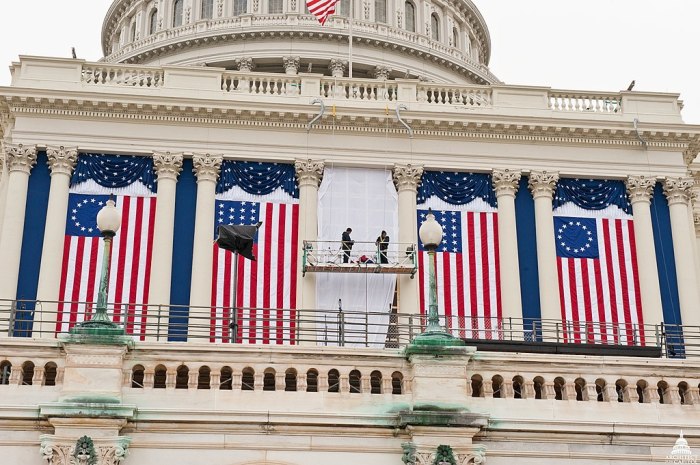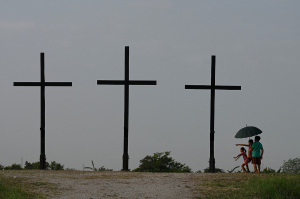A time for reckoning, repentance and revival

It was a beautiful cold day back when I was in middle school on a special trip that I have recently been looking back on.
My aunt, who knew of my love for all things social studies, took me to Washington, D.C., for the ultimate tour of our nation’s capital. We visited the White House, memorials, the Supreme Court and yes, the Capitol building.
I remember being awestruck by it, humbled by the majesty of the ultimate symbol of our democracy and drawn to the sight of fellow Christians with signs that had Bible verses while on their knees praying at the steps of the Capitol for revival in our land, and that was over 25 years ago.
Sadly, and tragically, I saw a vastly different sight on the steps of the Capitol on Jan. 6 of this year that literally caused me to weep. I wept for the state of our democracy that it is teetering on implosion; I wept for the hatred and division in our country that has been building for decades; I wept for fear of its future and how it will affect my children, and I wept for the spiritual state of our country, our church, and the Gospel that has been lost in all this noise.
It has been over a year now that has felt like being stuck in Jumanji, between a raging pandemic, racial tensions, political and ideological divides that are getting wider, economic, educational, emotional, mental tolls that we have never seen in our lifetime and amid it all, an increasingly divided, distracted, discouraged, fearful, evangelical church in America.
As a new political administration is set to take power and we head further into 2021, I genuinely believe evangelical Christians have arrived at a pivotal moment of self-reflection to reckon with where we are and who we are, to repent of any sin or areas or attituded that have taken us off message and to experience true revival.
Regardless of who you voted for this past November, America is clearly in a crisis not seen since the Civil War, and the year 2020 was my generation’s equivalent to 1968, a year of tumultuous chaos. Yet, Christ is often glorified most in times of crisis and if we as evangelicals truly desire to see a spiritual outbreak throughout our land in contrast to the viral ones, it must begin with us. “For it is time for judgment to begin with the household of God” (1 Peter 4:17).
It is time for reckoning
We need individually and collectively to ask ourselves: who are we? What are we to be known for and what are we to be about?
The Bible implores us to remember our identity in Christ, to remember that we are “aliens and strangers,” “citizens of heaven,” “ambassadors of Christ” who belong neither to the political left or right but to a Spiritual Kingdom, and not to an earthly country but to a Heavenly one.
As I like to paraphrase, we are to be Christians first, Americans second, and Republicans or Democrats/conservatives or liberals third, and in that order. Yet often we have reversed that order.
There is nothing wrong with being politically active. We should vote our conscience and care about issues where our faith and politics/culture collide, but there must not be a marriage between political figures and parities, and our Christian faith. Such a marriage has always and will always lead to corruption, distraction and destruction.
What are we to be known for? Our bumper stickers? Our social media posts maybe? Jesus said our love. Love for God, for ourselves, and for others. Our fruit, those Christ-like characteristics that we should be displaying to others.
What should we be about as evangelical Christians? What is our mission? What is our goal? If we believe our primary mission is to win arguments on Facebook or to get political power or even to get judges on the bench who will rule in our favor, we have lost sight of our mission from Jesus.
Our primary mission, the Great Commission, must be to share the Gospel of Jesus Christ, the Good News that God so loved the world that He gave His Son for our redemption.
Our priorities are misguided if we are more passionate about sharing our political views than we are in sharing Jesus. The Bible says that we have been entrusted with the message of the reconciliation God desires to have with fallen humanity and that we must implore with love, grace and boldness on behalf of Christ with our fellow man: “Be reconciled to God” (2 Corinthians 5:20).
It is a good day for the devil when Christians care more about scoring political points than in reaching lost souls for the Kingdom. We must be, as Brett McCracken said, prophets in our generation, not partisans.
It is time for repentance
All of us should prayerfully seek God to convict us in the areas of our individual lives where we need to change direction. Collectively, the past year has revealed several troubling areas or attitudes where I fear we must change or else we risk sacrificing our witness for the Gospel.
We need to strengthen our commitment in our Christian walk. Like it has with other aspects of society, the effects of COVID-19 and the subsequent lockdowns has exacerbated trends that were already occurring with the commitment level or lack of it with many in the faith.
Attendance in churches were already declining, giving was already declining but now some churches literally may not survive the pandemic. What is God is up to? As the Rev. Jesse Young told me, “God is shaking, sifting and shifting” us. All of us should look in the mirror and examine our level of commitment to wholeheartedly seeking and following Christ. Casual Christianity simply will not cut it any longer.
We need to be leery of conspiracy theories. In the past year between the coronavirus and polarizing politics, many fellow Christians sincerely believed and peddled baseless conspiracy theories, passed along misinformation as truth, false prophecies and in so doing have done serious harm to the authenticity of our representation of the truthfulness of the Gospel.
In the eye-opening documentary, The Social Dilemma, the co-founders of many pillars of social media warn that “fake” news spreads six times faster than actual true news. In a world that now has differing views of factual reality, we as Christians must have our feet in reality if we want to impact that reality, conveying the message of the one who declared Himself to be “the truth” (John 14:6) discerning truth from lies.
The coming years will call for all of us to know the truth, speak the truth, and to defend the truth. As Jesus warned, “If salt has lost its taste, how shall its saltiness be restored?” (Matthew 5:13). We must be able to engage in rational, logical, factual dialogue or else the world will be tone deaf to our message.
Finally, as Christians, we need to be about building bridges instead of burning them with the very people and culture we are meant to reach and shine in. In an age of echo chambers and tribalism, Us. vs. Them, and demonization of those who hold different political, ideological or religious beliefs than us, we would do well to remember Jonah.
The Bible’s unwilling prophet who was told by God to share His message with the people of Nineveh, tried to run out from that task, out of hatred and resentment for his enemies who he deemed unworthy to be shown compassion to.
He saw them as evil, not as men and women Jesus died for. If we are not careful, we will do the same thing. Jesus has called us to love our neighbor as ourselves, and that includes the people who vote differently, believe differently, look differently and live differently. No exceptions.
It is time for revival
Even as I suspect our culture will grow increasingly hostile to Judeo-Christian values in the coming years, which will mean more pressure and persecution for Christians in America, I honestly believe a spiritual revival and awakening like we have never seen before may be upon us, even as how we do church may not look the same.
Revived inner healing, Christian unity, passionate devotion, dedicated living, bold testifying, sacrificial giving, committed serving, and unconditionally loving are the roots that defined what the Christian church looked like in the first century, the church that “turned the world upside down” (Acts 17:6)for Jesus.
Difficult days are ahead, but whether we rise to the occasion at hand or have our identity and message lost in the mess of the madness all depends on how we respond to this moment. It is time to remember what it really means to be a Christian and to be sure we bear that name with honor and dignity. To be a Christian means to belong to Christ and to follow Him in a way that others will see Him in us. It is our time to shine.
“Do all things without complaining or disputing, that you may become blameless and harmless, children of God without fault in the midst of a crooked and perverse generation, among whom you shine as lights in the world.”-Philippians 2:14-15.
Pastor Stephen Mitchell is the senior pastor at Trinity Bible Church in Severna Park, Maryland. He is also the author of Taking A Stand In Our Dying Land and has spoken in various churches and retreats.




























